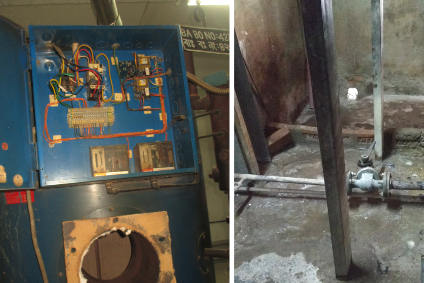
A pilot programme commissioned by signatories of the Accord on Fire and Building Safety in Bangladesh to explore boiler safety at readymade garment (RMG) factories in the country has found defects in all 35 inspected boilers.
Launched in September 2018 by Accord signatories, the pilot saw 35 boiler safety inspections conducted at 17 Accord-covered RMG factories. International boiler inspectors were despatched by product testing and certification specialist TUV-SUD for inspections in three phases, from 10-24 September, 3-16 November, and 2-8 December 2018.
Meanwhile, a group of five Accord engineers were also trained by, and shadowed, the TUV-SUD engineers during the inspections as part of an Accord engineers’ training programme. The boilers selected for inspection were a “representative sample” of the different sizes, fuel supply, types and capacities of boilers used in RMG factories in Bangladesh, the Accord said in a statement this week.
11 people were killed in Bangladesh in July 2017 when a boiler exploded at the Multifabs Limited garment factory, one of Swedish fashion retailer Lindex’s “most important” supplier factories.
Now, the Accord said the boiler safety findings identified the following:
- Calcium build-up, which reduces the capacity of the boiler. The calcium build-up can corrode the boiler wall, reduce efficiency, and lead to leakage and spray of boiling water;
- Boiler components/parts missing (for example, no or inadequate pressure valves, no or inadequate pressure monitoring systems);
- Faulty electrical wiring;
- Incomplete or non-existent technical data sheets.
In addition, inspectors found five boilers did not have the required Bangladesh Chief Inspector of Boilers (CIoB) certification, meaning they had been produced by an uncertified manufacturer. Boilers that have not been produced, installed and maintained to international and Bangladesh CIoB boiler standards constitute a potential life and property threat hazard, the Accord said.

US Tariffs are shifting - will you react or anticipate?
Don’t let policy changes catch you off guard. Stay proactive with real-time data and expert analysis.
By GlobalDataAt four factories, boiler safety engineers decided immediate boiler shut-down was necessary due to critical safety findings. The Accord informed the factory management, the responsible company signatories and CIoB of the findings and that the boilers should only be re-commissioned/returned to operation after the critical safety issues have been fixed. All factories where critical boiler safety hazards were found complied with the engineers’ conclusions and the boilers have been repaired and verified as such within a few days of the notification of critical findings.
“A complete boiler safety inspection includes an internal inspection of the boiler, a hydrostatic pressure test, and external inspection and assessment of the functionality of the boiler,” the Accord said. “During the pilot programme, 19 of the 35 inspected boilers could not undergo all stages of inspection because the boiler equipment at the factories was inadequate or defective. These 19 boilers, representing 54% of those inspected, require remediation work and reinspection and testing. Defects were detected in all 35 inspected boilers and all required remedial work.”
The Accord added, however, that it received a “good level of cooperation” from the 17 supplier factories whose boilers were inspected in the pilot program.
“The Accord has been working constructively with the Chief Inspector of Boilers (CIoB), whose input informed the commencement of the boiler safety inspections pilot,” it concluded. “The Accord signatories are committed to continue supporting the work of CIoB and to also work with the National Plan of Action and the ILO colleagues to advance boiler safety in RMG factories.”



